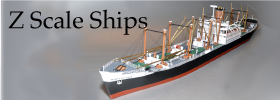- Posts: 6
- Thank you received: 6
Inductive Powering (mostly lights)
- CreatorLes
- Offline
- New Member
-

Less
More
10 years 6 months ago #17199
by CreatorLes
Inductive Powering (mostly lights) was created by CreatorLes
Would you like to have inductively powered lighting or other inductively powered accessories in your designs? I can make that happen.
See, I got to thinking about the story I keep telling everyone who will listen about my second childhood and how I've learned all these techie skills over the years and I'm happy to report that I'm not alone here at Z Central Station as I learned in the chatroom a few hours ago. I thought: what would be the easiest thing I could fairly quickly do that would have the biggest impact at the lowest cost for model railroaders? And I thought of inductive powering.
Inductive powering is not rocket science, it's really just a very bad resonant transformer. You generate a magnetic field with an oscillator, a power driver, and an antenna with capacitor. Then you put a little bitty coil of wire with capacitor and load (typically an LED) in that magnetic field. If you do it all right you can get a distance comparable to the size of the transmit antenna or larger.
This would be nice for rolling stock or for scenery because there would be no running of wires through the scenery surface and you could energize moving thing or adjust the position of things without worry of pulling the wires. It's also great for disassembling stuff for transport if you need that. Plus I think I can make it so simple and so effective and so inexpensive that you would use it just for the convenience.
Certain effects are possible too like flickering all the lights at once as in a storm or power outage or different amounts of lighting based on the ambient light of day or night. Your layout could have a "sun", overhead lighting that casts shadows and when the sun goes out the lights turn on, all at different levels of darkness. You could establish bedtimes and leave streetlights on... well you get the idea, lots of possibilities without having that rat's nest of wires underneath.
I will begin looking at this tonight and I hope that someone will reply with practical suggestions for introducing this technology to Z scale model railroading, that is if it has not been done already - cheers!
Les
See, I got to thinking about the story I keep telling everyone who will listen about my second childhood and how I've learned all these techie skills over the years and I'm happy to report that I'm not alone here at Z Central Station as I learned in the chatroom a few hours ago. I thought: what would be the easiest thing I could fairly quickly do that would have the biggest impact at the lowest cost for model railroaders? And I thought of inductive powering.
Inductive powering is not rocket science, it's really just a very bad resonant transformer. You generate a magnetic field with an oscillator, a power driver, and an antenna with capacitor. Then you put a little bitty coil of wire with capacitor and load (typically an LED) in that magnetic field. If you do it all right you can get a distance comparable to the size of the transmit antenna or larger.
This would be nice for rolling stock or for scenery because there would be no running of wires through the scenery surface and you could energize moving thing or adjust the position of things without worry of pulling the wires. It's also great for disassembling stuff for transport if you need that. Plus I think I can make it so simple and so effective and so inexpensive that you would use it just for the convenience.
Certain effects are possible too like flickering all the lights at once as in a storm or power outage or different amounts of lighting based on the ambient light of day or night. Your layout could have a "sun", overhead lighting that casts shadows and when the sun goes out the lights turn on, all at different levels of darkness. You could establish bedtimes and leave streetlights on... well you get the idea, lots of possibilities without having that rat's nest of wires underneath.
I will begin looking at this tonight and I hope that someone will reply with practical suggestions for introducing this technology to Z scale model railroading, that is if it has not been done already - cheers!
Les
The following user(s) said Thank You: Kelley, stonysmith
Please Log in or Create an account to join the conversation.
- Kelley
- Offline
- Dispatcher
-

Less
More
- Posts: 764
- Thank you received: 73
10 years 6 months ago #17200
by Kelley
Replied by Kelley on topic Re: Inductive Powering (mostly lights)
Lot of old dudes in model railroading. What would this do to pacemakers 
The following user(s) said Thank You: CreatorLes
Please Log in or Create an account to join the conversation.
- CreatorLes
- Offline
- New Member
-

Less
More
- Posts: 6
- Thank you received: 6
10 years 6 months ago #17202
by CreatorLes
Replied by CreatorLes on topic Re: Inductive Powering (mostly lights)
Nothing. But it's a very important question, so I'll say why that is my answer.
Pacemakers are sensitive to high frequency electrical signals because the wires that deliver the pacemaking signal from the pacemaker to the heart itself are like little antennae that are just the right length to pick up GHz range signals such as those from microwave ovens and RF equipment.
By contrast, inductive powering works at frequencies significantly lower than 1MHz, or 1000 times slower. That makes their wavelength over 1000 times longer so that very little signal at these frequencies can be supported by the pacemaker wires.
On the other end of the frequency spectrum we have audio at about 20 kHz max, so we don't want to operate that far down in order to prevent possible audio pickup on speakers or vibrations of the coils. So the range is 20 kHz to 1 MHz and frankly it's a lot easier to operate at 100 kHz instead of 1 MHz, or 10 times slower than described above. So in conclusion, the 'lectrons wiggle too slow to affect a pacemaker as far as I know.
Les
Pacemakers are sensitive to high frequency electrical signals because the wires that deliver the pacemaking signal from the pacemaker to the heart itself are like little antennae that are just the right length to pick up GHz range signals such as those from microwave ovens and RF equipment.
By contrast, inductive powering works at frequencies significantly lower than 1MHz, or 1000 times slower. That makes their wavelength over 1000 times longer so that very little signal at these frequencies can be supported by the pacemaker wires.
On the other end of the frequency spectrum we have audio at about 20 kHz max, so we don't want to operate that far down in order to prevent possible audio pickup on speakers or vibrations of the coils. So the range is 20 kHz to 1 MHz and frankly it's a lot easier to operate at 100 kHz instead of 1 MHz, or 10 times slower than described above. So in conclusion, the 'lectrons wiggle too slow to affect a pacemaker as far as I know.
Les
The following user(s) said Thank You: Kelley
Please Log in or Create an account to join the conversation.
Time to create page: 0.202 seconds
















